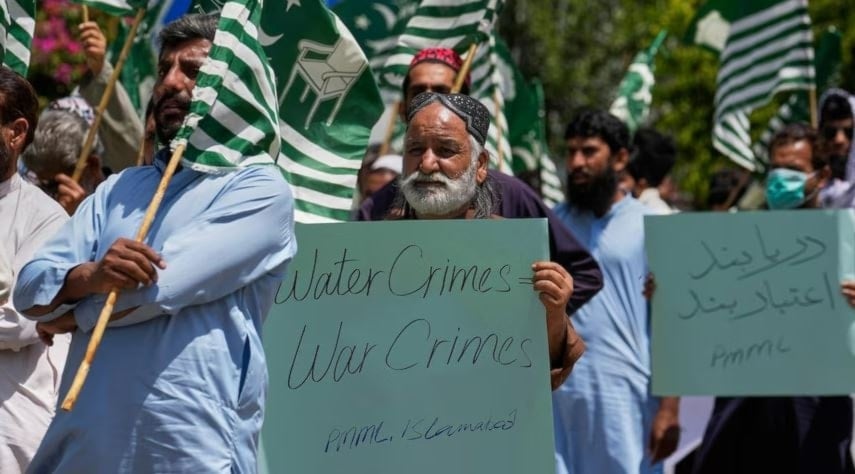India threatens Pakistan’s water supply with Indus river project plans
India is weighing plans to divert water from the Indus system to pressure Pakistan over Kashmir, risking the collapse of the 1960 Indus Waters Treaty and sparking fears of renewed regional escalation.
-

Pakistanis take to the streets in protest over India's decision to suspend the water deal. (AP/Anjum Naveed)
India is actively considering an aggressive expansion of water infrastructure on the Indus river system, which could significantly reduce flows to Pakistan, in retaliation for the April attack in Indian-occupied Kashmir that New Delhi blames on Islamabad, according to a Reuters exclusive.
The move risks upending the 1960 Indus Waters Treaty and escalating tensions between the nuclear-armed neighbors.
Shortly after 26 civilians were killed in a bombing in Indian-occupied Kashmir on April 22, Indian authorities suspended participation in the Indus Waters Treaty, a landmark agreement brokered in 1960 that governs water sharing between the two countries.
Though Pakistan denies involvement in the incident, the treaty has remained in limbo, even as both sides recently agreed to a ceasefire following one of their most intense military escalations in decades.
Indian Prime Minister Narendra Modi reportedly ordered an expedited review of projects on the Chenab, Jhelum, and Indus rivers, waterways primarily designated for Pakistan’s use under the treaty. Six sources familiar with internal discussions told Reuters that these plans include infrastructure upgrades that could restrict water flow into Pakistan’s Punjab province.
Ranbir canal expansion key to India’s water strategy
According to Reuters, among the major proposals is the doubling of the Ranbir canal, a British-era structure on the Chenab River. Currently 60 km long, the canal would be extended to 120km, allowing India to divert 150 cubic meters of water per second, up from the present 40, according to official sources.
Although the canal predates the Indus Waters Treaty, any large-scale expansion would mark a significant shift in India’s approach to water sharing, particularly given the region’s dependence on river-fed agriculture.
Reuters sources confirmed that deliberations on this project began in April and have continued despite the announced ceasefire. The Indian ministries of water and foreign affairs, along with Modi’s office, declined to comment.
In a recent speech, Modi declared: “Water and blood cannot flow together,” though he did not specifically refer to the treaty, as reported by Reuters.
Pakistan warns of 'act of war' over water diversion
Islamabad has warned that any attempt to divert or halt the natural flow of water into Pakistan from the Indus system would be seen as an “act of war,” as reported by Reuters. Around 80% of Pakistan’s agriculture relies on the Indus system, as do the bulk of its hydropower projects, serving nearly 250 million people.
While the infrastructure to execute such diversions would take years to complete, Islamabad has already seen a glimpse of its potential impact. In early May, water levels at a key Pakistani intake point dropped by up to 90% after India initiated maintenance on upstream projects, according to Reuters.
Water security expert David Michel from the Center for Strategic and International Studies noted that while any major diversion would take time, “the very intent to do so raises serious geopolitical risks.”
India eyes massive hydropower expansion in Kashmir
India’s broader strategy reportedly includes plans to increase its hydropower capacity in Jammu and Kashmir to 12,000 megawatts, up from the current 3,360 MW. A power ministry document seen by Reuters outlines potential projects, including the construction of dams capable of storing large volumes of water, something India has not previously undertaken in the Indus system.
At least five proposed storage projects are under consideration, four of which are located on tributaries of the Chenab and Jhelum rivers, Reuters said.
One internal note from a government company, created after the April 22 attack, recommends that waters from the Indus, Chenab, and Jhelum could be redistributed to Indian states in the north, potentially bypassing Pakistan’s allocations altogether.
Political implications and international legal action
The Himalayan region of Kashmir remains the core of hostilities between India and Pakistan. The territory is claimed in full by both sides, though each only controls part of it. India has long accused Pakistan of supporting armed insurgency in the region, an allegation Islamabad denies.
According to Professor Happymon Jacob of Jawaharlal Nehru University, the latest Indian moves signal a strategic pivot. “Delhi may now refuse to discuss Kashmir in any format and limit bilateral talks to targeted issues like the Indus Waters Treaty,” he said.
Pakistan’s government says it is preparing to take the matter to international forums, including the World Bank, which played a key role in drafting the original treaty, as well as the Permanent Court of Arbitration and the International Court of Justice, according to Reuters.
“Water should not be weaponized,” Pakistani Finance Minister Muhammad Aurangzeb told Reuters. “We don’t even want to consider any scenario which ... does not take into account the reinstatement of this treaty.”
Michel warned that the implications go beyond the India-Pakistan rivalry, “Some Indian analysts worry that if Delhi uses water as a tool of coercion against Islamabad, it could give Beijing the same justification against India in future water disputes.”

 5 Min Read
5 Min Read








